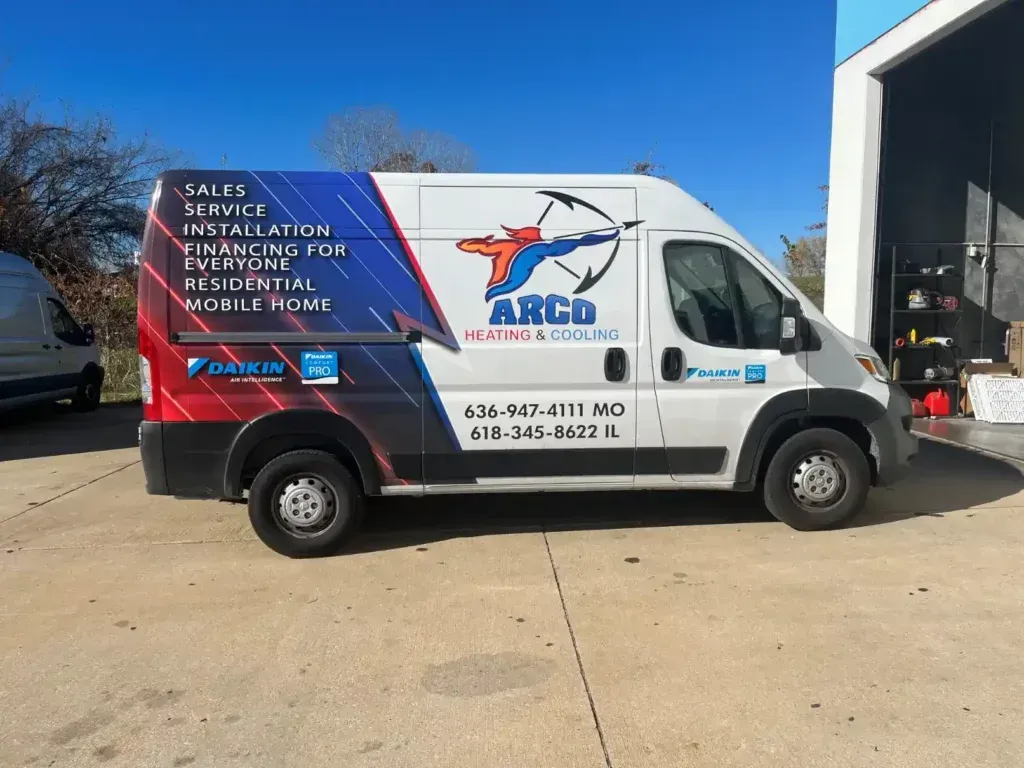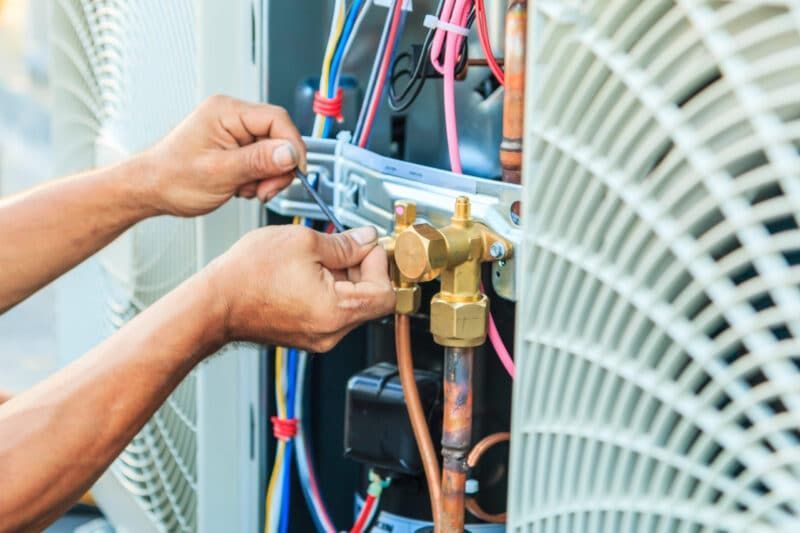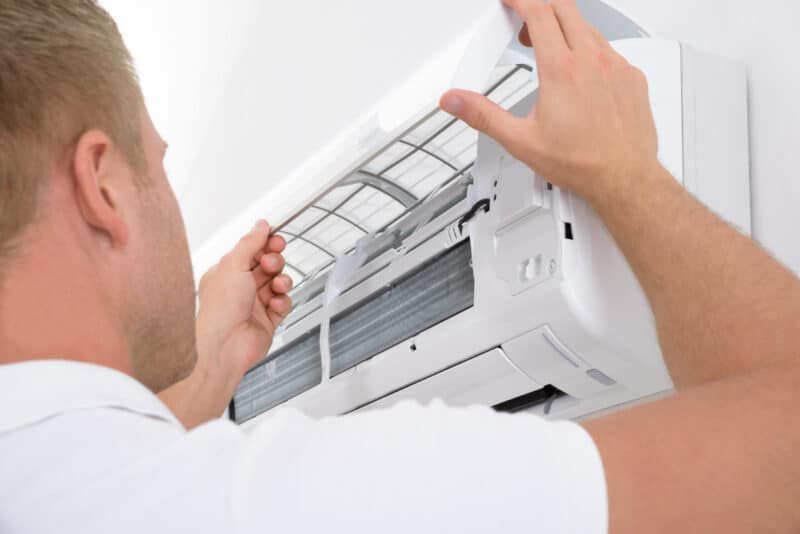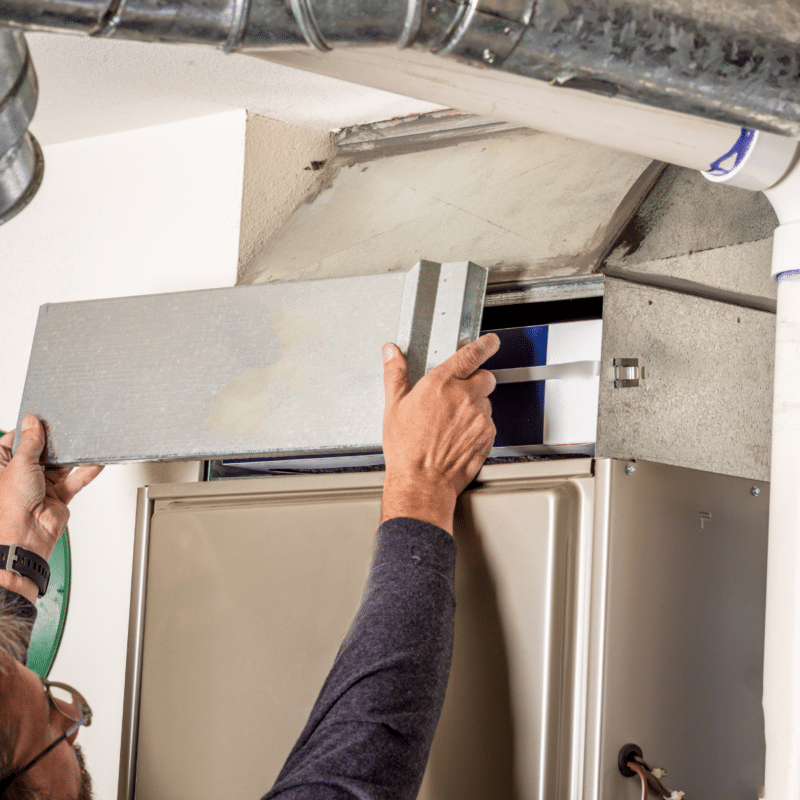Air Conditioner Install Service Near St. Charles, MO
Fast, Reliable, and Affordable Cooling Solutions
When you need HVAC services, trust the experts at ARCO Heating and Cooling. Our technicians have the skills, knowledge, and tools to fix most Heating & Cooling service problems on the spot.

ARCO Heating & Cooling Provides Air Conditioner Install Services in St. Charles and the surrounding St. Louis Metropolitan Area
Having a central air conditioning unit installed in your home can provide several benefits, making it a popular choice for many homeowners. Schedule an appointment today
Whole-House Cooling: Central air conditioning systems can cool your entire home, providing consistent comfort throughout all rooms. This is especially important in larger homes or homes with multiple levels.
Enhanced Comfort Control: Central AC systems offer precise temperature control through a thermostat, allowing you to set and maintain your desired temperature easily. Some systems also offer humidity control, which can improve comfort.
Year-Round Comfort: From AC repairs to heat pumps and indoor air quality improvements, we handle it all under one roof.
Longevity and Warranty: Central AC systems are designed to last for many years, and they often come with manufacturer equipment and labor warranties that can provide peace of mind.

The ARCO Air Conditioner Installation Process
- Detailed Assessment:
We carefully evaluate your space to determine the ideal AC system for your needs.
- Clear Communication:
You’ll receive a straightforward explanation of the recommended installation plan and system options.
- Upfront Pricing:
Transparent estimates are provided before we begin any work.
- Efficient Installation:
Our skilled technicians aim to complete the installation promptly and with precision.
- Final Inspection:
Before we leave, we ensure your new AC system is running smoothly and efficiently.
Why Installing a New Central Air Conditioning System is Worth the Investment
Your central air conditioning system is essential for maintaining a comfortable and energy-efficient home. If your current system is outdated or unreliable, installing a new one can be a game-changer. While the upfront cost might seem significant, the long-term benefits of a modern, efficient system make it a smart investment.
Here’s why installing a new AC system is often the best choice:
- Energy Efficiency: Lower Your Utility Bills New AC systems are designed to meet higher efficiency standards, consuming less energy while providing superior cooling performance. With advanced technology like variable-speed compressors and smart thermostats, a new system can help you achieve substantial savings on your energy bills year-round.
- Improved Comfort: Beat the Heat A new air conditioning system ensures consistent and reliable cooling, even during the hottest summer days. Modern systems also offer enhanced features like zoned cooling and dehumidification, creating a more comfortable environment tailored to your needs.
- Reliability: Avoid Unexpected Breakdowns Older systems are more prone to frequent repairs and unexpected failures. A new installation eliminates the stress of dealing with ongoing maintenance issues, offering peace of mind and dependable performance when you need it most.
- Environmental Benefits: Reduce Your Carbon Footprint Today’s A/C systems are not only more energy-efficient but also use eco-friendly refrigerants that have a lower impact on the environment. Upgrading to a modern system is a step toward sustainability and environmental responsibility.
- Increased Home Value: Boost Your Property’s Appeal
A newly installed A/C system can be a significant selling point if you’re considering putting your home on the market. Buyers often prioritize energy-efficient and reliable systems, making your property more attractive and potentially increasing its resale value.
- Smart Features: Enhance Convenience Many new A/C systems come with smart features, such as remote control via smartphone apps, programmable settings, and integration with home automation systems. These innovations make it easier to customize and optimize your home’s cooling system.

Installing a new central air conditioning system is an investment that pays off in multiple ways. From lower energy bills and improved comfort to greater reliability and enhanced property value, a modern A/C system can transform your living space and quality of life.
Need Air Conditioning Installation?
If you’re considering an air conditioning installation or want to learn more about your options, our team of HVAC experts is here to help. Contact us today to schedule a consultation and experience a smooth and efficient installation process.
AC Install Offers From ARCO Heating & Cooling

$129
A/C Maintenance Inspection
What you get from ARCO Heating & Cooling: If your system breaks down within 6 months of service;
- We'll come out at no cost to figure out the problem
- We'll give you priority scheduling service
- Credit the original maintenance charge toward the repair!
- 100% satisfaction guaranteed

$109
Ductless Mini-Split Repair
What you get from ARCO Heating & Cooling: If your system breaks down within 6 months of service;
- We'll come out at no cost to figure out the problem
- We'll give you priority scheduling service
- Credit the original maintenance charge toward the repair!
- 100% satisfaction guaranteed

$129
Heating System Maintenance
What you get from ARCO Heating & Cooling: If your system breaks down within 6 months of service;
- We'll come out at no cost to figure out the problem
- We'll give you priority scheduling service
- Credit the original maintenance charge toward the repair!
- 100% satisfaction guaranteed
Disclaimer: *Some restrictions or conditions may apply, call for details. Offer may be subject to credit approval. Must present offer at time of service. Not available to combine with other offers/promotions.
Frequently Asked Questions
What are the signs that my centralized A/C system needs repair or replacement?
What are the signs that my centralized A/C system needs repair or replacement?
There are several common signs that indicate your centralized air conditioning (AC) system may require repair or replacement. Recognizing these signs early can help you address issues promptly, potentially avoiding costly breakdowns and improving the efficiency of your system. Here are some key indicators:
- Insufficient Cooling: If your AC system is no longer keeping your space as cool as it used to, it may indicate a problem with the compressor, refrigerant levels, or other components.
- Uneven Cooling: Inconsistent cooling throughout your home or building can be a sign of issues with ductwork, airflow, or a failing thermostat.
- Poor Airflow: Reduced airflow from the supply vents can result from clogged air filters, duct obstructions, or problems with the blower motor.
- Strange Noises: Unusual noises such as banging, grinding, hissing, or squealing may suggest mechanical issues, loose components, or a failing compressor.
- Foul Odors: Musty or foul odors when the AC is running can be caused by mold or mildew growth in the system or dirty evaporator coils.
- High Humidity Levels: If your AC is struggling to control indoor humidity, it may indicate a malfunctioning dehumidification system or incorrect system sizing.
- Increased Energy Bills: A sudden or gradual increase in your energy bills without a corresponding change in usage may signal reduced efficiency in your AC system.
- Refrigerant Leaks: A decline in cooling efficiency and ice buildup on the evaporator coil can be signs of refrigerant leaks, which should be addressed promptly by a professional.
- Constant Cycling: If your AC system cycles on and off frequently (short cycling), it may be due to issues with the thermostat, compressor, or other components.
- Age of the System: Centralized AC systems have a limited lifespan. If your system is approaching or exceeding its expected lifespan (typically 10-15 years), it may be more cost-effective to replace it rather than repair it repeatedly.
- Inconsistent Thermostat Readings: If the thermostat displays inaccurate temperatures or fails to respond to temperature adjustments, it may need recalibration or replacement.
- Excessive Dust or Debris: A buildup of dust and debris on the evaporator and condenser coils can reduce system efficiency and cooling capacity.
- Water Leaks: Water leaks or moisture around the AC unit may indicate a clogged condensate drain line or a refrigerant leak.
- Frequent Repairs: If you find yourself repeatedly calling for AC repairs, it may be a sign that your system is nearing the end of its useful life, and replacement could be more cost-effective in the long run.
When you notice any of these signs, it’s essential to contact a licensed HVAC professional for a thorough inspection and diagnosis. They can determine the root cause of the issue and recommend the appropriate repairs or replacement if necessary. Regular maintenance can also help prevent many of these problems and extend the lifespan of your centralized A/C system.
What is a centralized air conditioning system?
A centralized air conditioning system, also known as a central air conditioner or HVAC (Heating, Ventilation, and Air Conditioning) system, is a cooling system that provides consistent and uniform cooling to an entire building or living space from a central location. This type of system is commonly used in residential homes, commercial buildings, and industrial facilities.
What are the benefits of installing a centralized air conditioning system?
Installing a centralized air conditioning system offers several benefits, making it a popular choice for cooling residential homes, commercial buildings, and various other types of spaces. Here are some of the key advantages:
- Consistent Cooling
- Energy Efficiency
- Improved Indoor Air Quality
- Convenience
- Quiet Operation
- Enhanced Property Value
- Precise Temperature Control
- Less Obtrusive
- Space Savings
- Longevity
Reduced Environmental Impact
It’s important to note that the specific benefits can vary depending on the type of centralized A/C system (e.g., split system, packaged system, ductless mini-split) and the quality of the installation. To maximize the advantages of a centralized air conditioning system, it’s essential to choose the right system for your needs, have it professionally installed, and maintain it regularly.
How does a centralized A/C system work?
A centralized air conditioning (AC) system works by cooling and distributing conditioned air throughout a building or living space from a central location. The process involves several key components and a series of steps:
- Thermostat Control: The operation of the centralized AC system is controlled by a thermostat, which is typically installed in a central location within the building. Users can set the desired temperature on the thermostat to maintain a comfortable indoor climate.
- Central Unit: The heart of the system is the central unit, often located outside the building. This unit contains essential components, including:
- Compressor: The compressor pressurizes and circulates refrigerant throughout the system.
- Condenser Coil: The refrigerant, in a high-pressure, high-temperature state, is passed through the condenser coil to release heat and become a high-pressure liquid.
- Evaporator Coil: Located inside the building, the evaporator coil is responsible for absorbing heat from the indoor air.
- Refrigerant Lines: Copper or aluminum refrigerant lines connect the indoor and outdoor units, allowing the flow of refrigerant between them.
- Air Handling Unit: Inside the building, the air handling unit (AHU) is connected to the central unit through the refrigerant lines and contains the evaporator coil. The AHU circulates air from the building over the evaporator coil, where heat is absorbed, causing the air to cool down.
- Air Distribution: A network of ducts and vents is used to distribute the cooled air throughout the building. The cooled air is blown into various rooms or areas through supply vents or registers. Meanwhile, warm air is drawn back into the system through return vents.
- Filtration: Many centralized AC systems incorporate air filters to remove dust, allergens, and other particles from the incoming air, improving indoor air quality.
The basic operational cycle of a centralized AC system is as follows:
- The thermostat senses the indoor temperature and compares it to the set temperature.
- If the indoor temperature exceeds the set point, the thermostat signals the central unit to start cooling.
- The compressor in the central unit begins to circulate refrigerant. It takes heat from inside the building or home and releases it outside.
- As the indoor air passes over the evaporator coil, it loses heat, becoming cooler and more comfortable.
- The cooled air is distributed through the ductwork and supply vents, lowering the indoor temperature.
- The process continues until the indoor temperature matches the desired set point on the thermostat.
- The system cycles on and off to maintain the set temperature.
It’s important to note that centralized A/C systems can vary in complexity and features, and some systems offer additional capabilities such as zoning, humidity control, and advanced thermostat options. Additionally, regular maintenance is crucial to ensure the system operates efficiently and effectively.
What types of centralized air conditioning systems are available?
Centralized air conditioning systems come in several types, each designed to suit specific needs and installation scenarios. Some of the most common types of centralized A/C systems include:
Split System Central Air Conditioners:
This is the most common type of residential centralized A/C system.
It consists of two main components: an indoor unit (evaporator coil and air handler) and an outdoor unit (compressor and condenser coil).
Split systems use a network of ducts to distribute cooled air throughout the building.
- They are suitable for homes and smaller commercial spaces.
- Packaged Central Air Conditioners:
- Packaged systems combine all the components (compressor, condenser, evaporator, and air handler) into a single outdoor unit.
- They are typically used in commercial buildings and homes with limited indoor space.
- Packaged units are available in different configurations, including rooftop units and ground-mounted units.
Ductless Mini-Split Systems:
- Ductless mini-split systems are highly versatile and suitable for both residential and commercial applications.
- They consist of an outdoor condenser unit connected to one or more indoor air-handling units via refrigerant lines.
- Unlike traditional systems, they don’t require ductwork, making them ideal for retrofits and room-specific cooling.
- Ductless mini-splits can provide zoned cooling, allowing for individual temperature control in different rooms or zones.
The choice of centralized A/C system type depends on factors such as the size of the space to be cooled, existing infrastructure (e.g., ductwork), energy efficiency goals, and budget considerations. Consulting with an HVAC professional is essential to determine the most suitable system for a specific application and ensure proper installation and performance.
Is professional installation necessary, or can I do it myself?
Professional installation is highly recommended, and in many cases, necessary for centralized air conditioning systems. Here are several reasons why professional installation is essential:
- Complexity: Centralized A/C systems are complex and require a deep understanding of HVAC principles, electrical work, refrigeration, and ductwork. Installing such a system without the necessary expertise can lead to errors, poor performance, and safety hazards.
- Sizing and Load Calculation: Determining the correct size of the A/C system for your space is crucial. An HVAC professional will perform a load calculation to assess factors like square footage, insulation, and climate to select the appropriate system size. An improperly sized system can result in inefficiency and discomfort.
- Ductwork: If your system relies on ducts for air distribution, they must be designed and installed correctly to ensure proper airflow and cooling. Leaky or poorly designed ductwork can lead to energy waste and inefficient cooling.
- Refrigerant Handling: Handling refrigerant requires specialized knowledge and certification due to environmental regulations. HVAC professionals are trained to handle refrigerants safely and prevent leaks, which can harm the environment and pose health risks.
- Electrical Work: Centralized A/C systems involve electrical connections, including high-voltage wiring. Incorrect electrical work can lead to safety hazards, including electrical fires or shock hazards.
- Manufacturer Warranty: Many manufacturers require professional installation to maintain the warranty on the A/C equipment. DIY installation may void the warranty, leaving you responsible for repair or replacement costs.
- Performance and Efficiency: Professional installation ensures that your A/C system operates efficiently and delivers the expected cooling capacity. Improper installation can lead to energy inefficiency, higher utility bills, and a shorter system lifespan.
- Safety: HVAC professionals are trained to identify and address safety issues, such as ventilation requirements, gas connections, and potential carbon monoxide risks in certain heating and cooling systems.
- Permits and Codes: HVAC professionals are familiar with local building codes and permitting requirements. They will obtain the necessary permits and ensure that the installation complies with all relevant regulations.
Upgrade Your Comfort with a New AC System!
Looking for a reliable contractor for your AC installation in St. Charles or the surrounding St. Louis metropolitan area?? Contact Arco Heating & Cooling today! Our expert team is ready to install a high-efficiency cooling system tailored to your needs—ensuring comfort, reliability, and energy savings. Schedule your AC installation now!.

At Arco Heating & Cooling, we’re more than just another local HVAC company—we’re your neighbors, committed to keeping your family comfortable year-round. Contact us today for all your heating and cooling needs.
Services
Resources
Careers
Contact us
Hours
8AM - 4:30 PM Mon - Thurs
8AM - 4PM Fri
Copyright © 2025 – Arco Heating & Cooling All Right Reserved
Website Design and Search Optimization by ZaoMedia